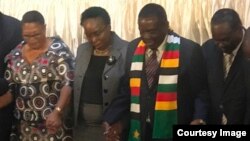Zimbabwe President Emmerson Mnangagwa on Friday held a meeting with several opposition parties as part of his ongoing efforts to engage different stakeholders in the country in a dialogue, to help address some of the country’s pressing problems, including the devastated economy.
Mnangagwa launched the Political Actors Dialogue (POLAD) last month, comprising mostly leaders of the 22 opposition parties that contested in the July 30th election.
Mnangagwa was declared the winner of that election by the Constitutional Court, following a challenge by the main opposition Movement for Democratic Change Alliance, which disputed the outcome.
The MDC led by Advocate Nelson Chamisa, which is still challenging Mnangagwa’s legitimacy, has refused to partake in the ongoing dialogue.
A major challenge to Mnangagwa’s presidency since taking over power from longtime leader President Robert Mugabe, who resigned under pressure from the military in 2017, has been the economy, which has been compounded by the fact that the country lacks its own currency, and has been depending on the U.S. dollar and other currencies.
Addressing those gathered at POLAD, Mnangagwa reiterated an earlier promise that Zimbabwe will soon have its own currency.
“It is more critical that we have our own currency,” said Mnangagwa. “The creation of wealth, infrastructure, we have in the country will determine the level of the supply of money in the country. So it is necessary that we have our own currency.”
Mnangagwa said the currency, once introduced, will essentially put an end to the multiple currencies currently in use in the country for most transactions, as everyone will then have to convert their foreign currency to local money, at a bank or exchange bureau, to do any transaction.
Zimbabwe has not had its own currency since 2009.
“The US dollar cannot anymore transact in the country,” declared Mnangagwa. “If you go to the UK, with your US dollar, or you go to Zambia, or you go to South Africa nearby, with your US dollar or your Euro, you cannot transact in any hotel, or in any restaurant, or in a shop. You go to the bank and they change the money and you’ll be given the rand, then you transact. You go to London, you change it and you’re given a pound to transact. You go to Zambia, you have to go and change and you’ll be given a kwacha, and then you transact. So all the money that is in the shops or elsewhere, will not work until it goes through the bank to be changed into the local currency to do transactions,” said Mnangagwa.
A consequence of the lack of a steady currency has been erratic prices on basic commodities driven by an irregular exchange rate between the local currency known as Real Time Gross Settlement (RTGS) and the US dollars.
Shortages of both the local and foreign currencies have driven up prices of basically all necessities, including fuel and a variety of food stuffs like bread, sugar, cooking oil and mealie meal, used to make the staple, sadza.
While many blame Mnangagwa’s government for failing to tame prices and penalize those who hike prices unfairly, arguing that it is within the government power to put a stop to the malpractice, Mnangagwa and his administration have distanced themselves from those hiking prices, and have even accused businesses and vendors who hike prices of taking advantage of the system.
“Honestly, a packet of sugar in a store, you wake up in the morning and the price has increased, what happened? It would be better if the prices increase, then you also increase the prices for workers (salary), then they’ll be no complaints, there’ll no complaints because they will be having buying power. And you find that some companies and shops, saying they want US dollars, but the same company, the same employer, has never paid his workers in US dollars...but he demands payment in US dollars.”
Among the opposition groups that attended the POLAD was the MDC led by Dr. Thokozani Khupe. The party’s vice president, Obert Gutu, said they have welcomed the call to dialogue, simply to help improve lives for the common people, not to endorse the government of President Mnangagwa.
Gutu said a monitoring and evaluation committee has been set up to hold the president accountable to any agreement reached at POLAD.
“We have said that by us being here, we have not come to just say what pleases the government,” said Gutu. “We are not looking for jobs, we are not even looking for a power sharing arrangement. We are simply looking to improve the situation for the people of Zimbabwe.”
Spokesperson Jacob Mafume of the MDC led by Advocate Nelson Chamisa, however, reiterated with his party’s position that there will be no dialogue until Mnangagwa accepts their stance that he is not the legitimate leader of the country, despite the outcome of the Constitutional Court.
“We are waiting and saying that the discussion we will hold must start with (President) Mnangagwa as president of Zanu, (Advocate Nelson) Chamisa as the people’s president. Once Mnangagwa agrees to meet with Chamisa, then we’ll organize how this discussion will proceed, and discuss issues of legitimacy and the economy and international relations,” said Mafume.
Mafume, who also criticized the government’s use of national resources to host POLAD, said another condition for the party to hold talks with Mnangagwa, is the selection of a neutral arbitrator or mediator, to sit in on the discussions.




